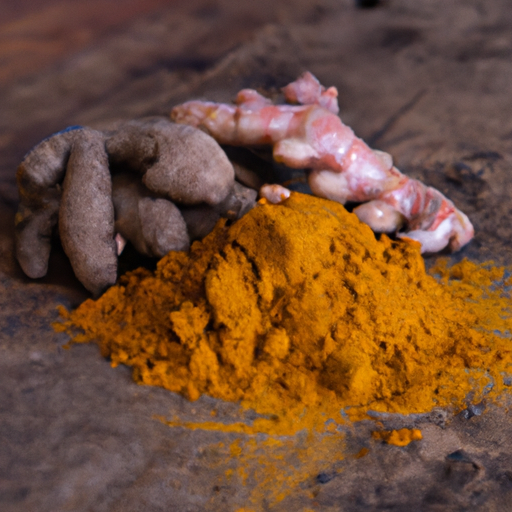As a health and wellness fan, I’ve come across numerous claims about the potential advantages of turmeric tea. Some suggest that it may help decrease inflammation, enhance cognitive abilities, and possibly even lower the risk of cancer. With these assertions being so widespread, it begs the question: does turmeric tea truly deliver on its promises?
In this article, I will dive into the potential health benefits of turmeric tea and examine the scientific evidence and studies that support (or challenge) these claims. Additionally, I will discuss possible side effects and precautions to keep in mind when consuming turmeric tea.
By the end of this article, you’ll have a better understanding of whether or not turmeric tea is worth incorporating into your daily routine.
Key Takeaways
- Turmeric tea has been used for centuries in traditional medicine for its anti-inflammatory properties.
- Curcumin, the active ingredient in turmeric, can reduce inflammation and has been shown to be as effective as ibuprofen in reducing pain and swelling in patients with osteoarthritis.
- Turmeric tea may have potential health benefits for weight loss, with some studies showing that curcumin can increase weight loss and reduce body fat in overweight individuals.
- While generally considered safe, turmeric tea may interact with certain medications and should be avoided by people with gallbladder problems or those undergoing surgery. It is important to consult with a healthcare professional before adding turmeric to your diet, especially if taking medication or have a medical condition.
What is Turmeric Tea?
You’ve probably heard of turmeric tea – it’s the perfect way to spice up your morning routine and boost your health at the same time! Turmeric tea is a beverage made from the root of the turmeric plant, which is native to India and Southeast Asia. This bright yellow spice has been used for centuries in traditional medicine, and is known for its anti-inflammatory properties.
Turmeric tea recipes vary depending on the culture and region, but they typically involve boiling or steeping grated or ground turmeric in water or milk. Some recipes also include other ingredients such as ginger, cinnamon, honey, or lemon.
In traditional Indian medicine, turmeric has been used to treat a variety of ailments including digestive issues, skin problems, and joint pain. Its cultural significance in traditional medicine is evidence of its potential health benefits, which we’ll explore in the next section.
Potential Health Benefits of Turmeric Tea
There’s evidence that drinking this vibrant yellow beverage can aid in reducing inflammation, with a study published in the Journal of Alternative and Complementary Medicine finding that curcumin, the active ingredient in turmeric, was as effective as ibuprofen in reducing pain and swelling in patients with osteoarthritis. In addition to reducing inflammation, turmeric tea may also have potential health benefits for weight loss. While more studies are needed to confirm these benefits, some studies have shown that curcumin can increase weight loss and reduce body fat in overweight individuals.
If you’re interested in trying out turmeric tea, there are plenty of turmeric tea recipes available online. It’s important to note that while turmeric tea may have potential health benefits, it should not be used as a replacement for medical treatment. Scientific evidence and studies can provide a more comprehensive understanding of the potential benefits and risks of consuming turmeric tea.
Scientific Evidence and Studies
If you’re curious about the potential health benefits of turmeric tea, it’s worth exploring the scientific evidence and studies behind it. However, there’s some controversy about the effectiveness of turmeric tea in treating specific health conditions.
While some studies have shown promising results, others have had mixed or inconclusive findings. One factor that may contribute to the mixed results is the varying consumption patterns of turmeric tea.
Some studies have used high doses of turmeric extract, while others have used lower doses of the spice in tea form. Additionally, the bioavailability of the active compound in turmeric, curcumin, may be limited when consumed alone, but can be increased when combined with certain ingredients like black pepper.
Overall, more research is needed to determine the most effective dose and consumption method for turmeric tea. With that said, it’s important to note that turmeric tea is generally considered safe for most people, but there are some possible side effects and precautions to keep in mind.
Possible Side Effects and Precautions
Before you start adding turmeric to your diet, it’s important to be aware of some possible side effects and precautions that come with consuming this spice.
While turmeric has been shown to have numerous health benefits, it can also have negative effects if consumed in excess or by certain individuals. Turmeric tea risks include gastrointestinal issues such as nausea, diarrhea, and bloating. Additionally, it may interact with certain medications, such as blood thinners, and should be avoided by people with gallbladder problems or those undergoing surgery.
To ensure safety measures when consuming turmeric tea, it’s recommended to start with small amounts and gradually increase the dosage. It’s also important to consult with a healthcare professional before adding turmeric to your diet, especially if you’re taking medication or have a medical condition.
Negative effects of turmeric tea can also be minimized by choosing high-quality turmeric and preparing it properly. Overall, while turmeric tea has potential health benefits, it’s essential to be aware of the possible risks and to consume it in moderation.
Frequently Asked Questions
How does turmeric tea taste?
I recently tried turmeric tea and found it to be quite earthy with a subtle spicy kick. However, beyond taste, turmeric has been linked to numerous health benefits, including reducing inflammation and improving brain function.
Is it safe to consume turmeric tea during pregnancy?
As someone who has researched the topic, it is generally considered safe for pregnant women to consume turmeric tea in moderation. However, it is always best to consult with a doctor beforehand. Additionally, turmeric tea has potential benefits for skin health.
Can turmeric tea help with weight loss?
Turmeric tea may aid in weight loss by boosting metabolism, but it is not a magic solution. Evidence shows that it can enhance fat burning, but should be combined with a healthy diet and exercise for optimal results.
What is the recommended dosage of turmeric tea?
After researching, the recommended dose of turmeric tea is 1-2 teaspoons of ground turmeric per cup of water. Daily consumption may aid in reducing inflammation, improving brain function, and reducing the risk of chronic diseases.
Can turmeric tea interact with certain medications?
Interactions with medications can occur when consuming turmeric tea, potentially leading to adverse effects. It is important to consult with a healthcare provider to assess any potential risks and determine safe dosages.
Conclusion
In conclusion, after researching and trying turmeric tea myself, I can confidently say that it does work. Not only is it a delicious and comforting beverage, but the potential health benefits are numerous.
From reducing inflammation and aiding digestion, to potentially preventing certain diseases, turmeric tea is a powerhouse of natural medicine. However, it’s important to remember that turmeric tea is not a cure-all, and you shouldn’t rely on it as the only form of treatment for any health condition.
It’s always best to consult with a healthcare professional before making any significant changes to your diet or lifestyle. Overall, incorporating turmeric tea into your daily routine can be a simple and enjoyable way to support your overall health and wellbeing. As the saying goes, "a cup of turmeric tea a day keeps the doctor away."










